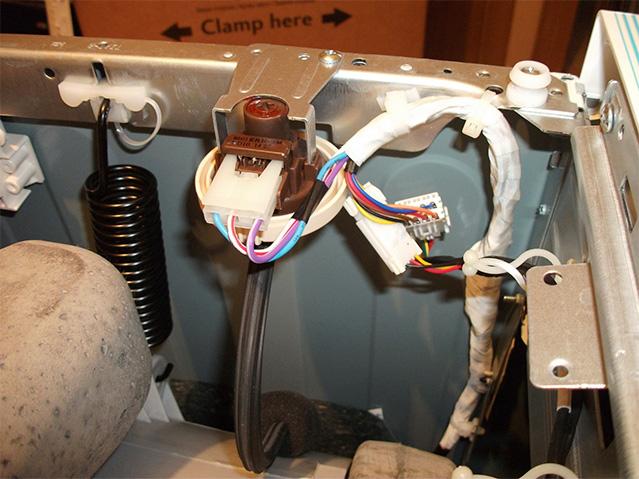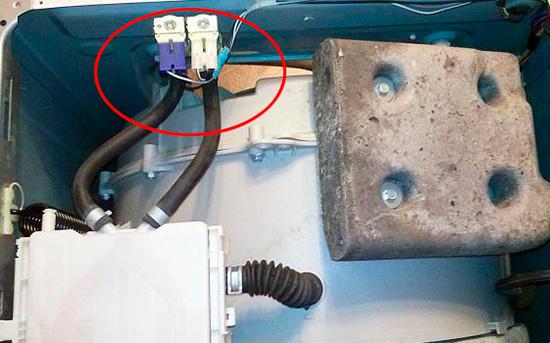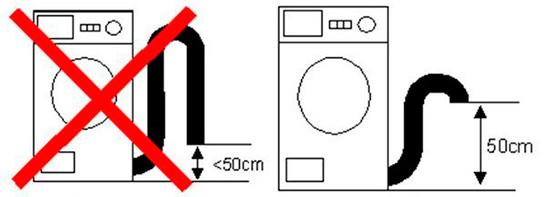Washing machines do not break down very often, but breakdowns do happen, and they can usually be noticed during the washing process. One such malfunction is when the washing machine takes on a lot of water. In other cases, the machine draws little water. But the causes of these seemingly opposite faults may be interrelated. Therefore, in the context of this article, we will consider both problems and find their solution.
Washing machine overflows with water
First, consider the problem when there is too much water when washing. This situation can be caused by several reasons.Let's take a look at them all in order.
Broken water level sensor (pressure switch)

This is probably the most common reasonwhen the machine takes on a lot of water. By the way, the same reason can also be when the washing machine is gaining little water. And that's why.
The water level sensor is designed to measure the fullness of the tank, depending on how much water is in the tank, it gives the corresponding indicators to the control module, which, in turn, controls the opening and closing of the filling valve.In simple words, we can say this: As soon as the water has reached the desired level and the control module has received the appropriate signal from the level sensor, the module immediately shuts off the water supply to the machine. Thus, there will be exactly as much water in the washing machine as is laid down by the program.
If your water level sensor is broken, then the machine will not know how much water is in the tank, respectively, the level may be more or less than it should be.
To rule out this cause, you can check the pressure switch for operation, then (if it malfunctions) replace it with a new one.
Fill valve malfunction
The filling valve is a device similar to a conventional faucet, which is powered by electricity. When you need to open it, voltage is applied to its coils, and water begins to flow into the washing machine. As soon as the voltage stops being supplied, the valve closes and the water stops flowing through it.

If it is the filling valve that has broken, then it may not shut off the water, and it will go to the machine, which in turn will overflow. If you notice that during washing, water flows continuously into the tank, then most likely it is the valve that has failed.
Check the inlet valve of the washing machine on performance, if the problem is in it, then it should be replaced with a new one.
Washing machine takes on little water when washing
The second situation, when the washing machine draws little water, may be caused by the following malfunctions.
The pressure switch broke
As we wrote above, there can be only one reason for overflow and underfilling of water - a breakdown of the water level sensor, which does not send or sends incorrect readings to the control module. As in the case of water overflow, the sensor needs to be checked for a fault and replaced on new. We also recommend that, with a working sensor, check the tube that connects it to the high pressure tank, and inspect it for defects and blockages in it - they should not be.
Spontaneous draining of water
It may seem to you that the machine is taking on little water, but in fact, a sufficient amount of water is supplied.It may simply be that the water spontaneously drains from the machine and therefore it becomes small in the tank. Usually in such a situation, the washing machine starts to draw water again and so on ad infinitum, as a result of this washing time increases.
This happens for several reasons:
- Wrong connection of the washing machine - the fact is that many do not pay attention to the instructions for connecting the washing machine to the sewer, but in vain. In order to prevent water from spontaneously draining into the sewer, it is necessary to connect the drain hose to the sewer pipe at a height of 50 cm from the floor. And it's better to use siphon for washing machine connection.
- Pressure in sewer pipes - if you connected the washing machine correctly, but the water still drains itself, then the problem may lie in the fact that increased pressure occurs in the sewer pipes and it turns out that it draws water from the washing machine.In order to prevent spontaneous draining of water in this case, it is necessary to install a special “anti-drain” valve in the gap in the drain hose of the washing machine.


Comments
Hello,
How to make the washing machine draw more water, ato very little from the beginning of the purchase,,
Samsung, with horizon, loading
Thanks in advance
Hello! I don't know what to do anymore, help me. Wash Samsung wf6458n7w. At first, the wife said that during the wash, the machine gave some kind of error, and stopped working. I changed the brushes along the way bearings and oil seal. I thought everything, but no, then the water stopped collecting. I replaced the valve but still the same. Now I'm thinking maybe it's all because of the pressure switch. By the way, sometimes error 4E slips through.Please tell me what happened.